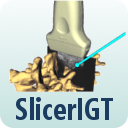3D Slicer
3D Slicer is a free, open source software for visualization, processing, segmentation, registration, and analysis of medical, biomedical, and other 3D images and meshes; and planning and navigating image-guided procedures.
Software toolkit for rapid development of image-guided therapy systems - for minimally invasive medical procedures, where operators rely on computer-generated images rather than direct sight of the target organs.
Image-guided therapy (IGT) stands for medical procedures performed inside patients, where operators rely on computer-generated images rather than direct sight of the target organs. We are supporting IGT research by maintaining a software kit for rapid development of IGT applications. This software kit is SlicerIGT.
Builds on a dynamic platform
SlicerIGT is an extension of 3D Slicer, a free, open source software for visualization and image analysis. SlicerIGT can be installed from the 3D Slicer Extension Manager on Windows, Mac, and Linux to use all the advanced features of 3D Slicer for real-time navigation.
Development without coding
Modules of SlicerIGT are designed so you can configure a procedure-specific application without programming, or with minimal scripting. We have configured SlicerIGT to support many procedures including brain surgery, urology, regional anesthesia, and more…
SlicerIGT is open
Our development and research work is public, including source code, data, experiment protocols, manuals, etc. SlicerIGT is distributed under the BSD-style Slicer license allowing academic and commercial use without any restrictions.
SlicerAIGT: Deep learning software modules for image-guided medical procedures. Includes tools for data collection, training, and deployment from 3D Slicer. Source code

3D Slicer is a free, open source software for visualization, processing, segmentation, registration, and analysis of medical, biomedical, and other 3D images and meshes; and planning and navigating image-guided procedures.
SlicerRT allows users to analyze spatio-temporal accumulation of the therapeutic dosage (radiation, thermal, etc.). Tools include dose visualization, quantitative metrics computation, comparison, and import/export to DICOM format.